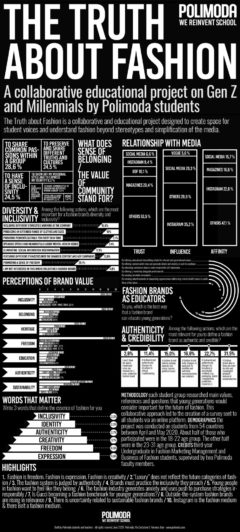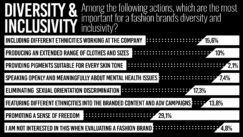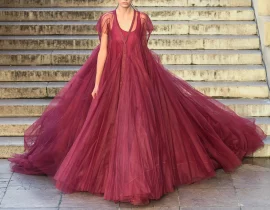Image credits: Polimoda, photography Federica Fioravanti, fashion designer Federico Cina
Polimoda publishes “The Truth About Fashion,” an investigation on the future of fashion according to Generation Z and Millennials. This research project – conducted by a group of Fashion Marketing Management and Business of Fashion students and under the supervision of teachers Lilit Boninsegni and Silvia Fossati – makes space and creates a platform for the voices of the new generations by diving into our students’ mental processes and analyzing their visions on the future of fashion.
To conduct their research, students and teachers followed the methodology used for school projects. First, they identified values, references and questions that the younger generation considers most relevant for the future of fashion. Then, they carried out an online survey that was submitted to all Polimoda students between April and May 2020. The results reveal the opinions of 300 students. The first half are in the 18-22 age group (Undergraduate courses), the second half are in the 23-31 age group (Master courses) and they are from 54 countries.
“The research is qualitative. What I mean by that is we asked students to establish the parameters and values of the research itself. We didn’t just ask them questions or we would have already known the answers. If you want to do something for young people, you have to let them do it,” emphasizes Danilo Venturi, Director of Polimoda.
The results show that freedom is the value perceived as a priority for Gen Z and Millennials, followed by a strong need for authenticity and identifying with values. They seek fashion that is meaningful, sends a message and that truly practices the diversity, inclusiveness and sustainability that it preaches.
Below are the main highlights discovered in the research project.
Fashion Is Freedom. Fashion Is Expression. Fashion Is Creativity
When asked to summarize the essence of fashion, the message sent from our students is clear: fashion is freedom and creativity. Luxury does not belong to this territory. What is fashion, if not an expression? What is fashion, if not freedom? What is fashion, is it doesn’t belong to anything? What is fashion, if not authentic? Fashion as we know it comes from the experimentation and interpretation of social changes. The strongest brands have become relevant because of the risks they take, the declarations they make, or their aesthetic for young generations and subcultures. The market today is full of options and meanings. This research brings to light the global nation of youth’s need to find their identity in fashion — just like older generations did — and with the same desire to belong to something in an authentic way.
“Luxury” does not reflect the future categories of fashion
The term luxury is no longer a way that young people differentiate brands. Brands, just like media, have become a fluid category and — while the magazine covers have become works of art — young people are looking at pixelated images on peer-to-peer platforms and content shared by their friends. Fashion is perhaps no longer a synonym of luxury. It’s become a common language used by young people. With this in mind, could the Global Nation of Youth become a subculture?
The fashion system is judged by authenticity
Authenticity is the most relevant value for young generations in addition to freedom. The Global Nation of Youth is aware of fake news and the lack of truthful information on social networks. That being said, young people think authenticity is the most important aspect of the fashion system and they have a hard time believing what they read. They are looking for concrete changes and actions: the elimination of wasteful production practices, a true reorganization of production methods and most of all, brands that focus on meaningful and durable products with environment-friendly practices.
Brands must practice the inclusivity they preach
Brands promote a variety of different races and ethnicities in their fashion advertising yet, within their companies, young people acknowledge that there is still a struggle within work culture. Offering a bigger range of sizes and using models from all over the world isn’t enough for younger generations. Companies must focus on diversity hiring. Young people would like to eliminate discrimination in the workplace based on sexual orientation, race and religion. Some brands must do the work within their companies on the inside and start practicing what they preach on the outside. They must promote freedom.
Young people in fashion want to feel like they belong
A sense of belonging is one of the most important values for younger generations. For Millennials and Generation Z, feeling part of a community is a fundamental aspect of life and also something they look for in fashion brands as well. When we asked our students about the meaning of “sense of belonging,” they shared feelings on identity, music and their passions. Young people want brands to focus on what we all have in common instead of our differences.
The fashion industry generates anxiety and uses push to purchase strategies irresponsibly
Education is a key factor when evaluating a fashion band. Values like respect and meaning are important factors missing in the fashion industry. The market is aggressive and push to purchase strategies are stronger than ever. If you think about it, Instagram was a social network for sharing beautiful photos in 2011 and today, in 2020, it has become a giant e-commerce. Brand values are perhaps missing. Young generations are starting to notice this trend and believe communication that creates anxiety must be eliminated and brands — including their ambassadors — must start educating themselves and acting responsibly with their storytelling.
Is Gucci becoming a fashion benchmark for younger generations?
Gucci is the closest brand to Generation Z and Millennial values. Their scores ranked very high overall and they are considered authentic. However, the findings show that there might be a sense of mistrust. On the other hand, Jaquemus, a brand created by a young millennial in the south of France, was mentioned for authenticity and sustainability.
Outside-the-system fashion brands are rising in relevance
Young generations still love big brands because of their values, but there is an interesting panorama emerging of new nice brands loved for their authenticity, education and sustainability. A few examples are Gabriela Hearst, Pangaia, Bethany Williams and Nudie Jeans. Some of these examples aren’t considered fashion brands, but digitally born brands offer communication and production in line with values of authenticity and education. Old school brands are still relevant: Rick Owens for a sense of community, Margiela for freedom and Prada for culture.
There is uncertainty related to sustainable fashion brands
Uncertainty is high in this area. Sustainability is still connected to brands like historically sustainable Patagonia and Stella McCartney. Some new brands are considered authentic with a less wasteful approach like Veja, Pangaia and Bethany Williams. Big brands with recent sustainable approaches were not strongly associated with sustainability as a value.
The full research project can be viewed on the Polimoda website: https://www.polimoda.com/publications/truth-about-fashion







